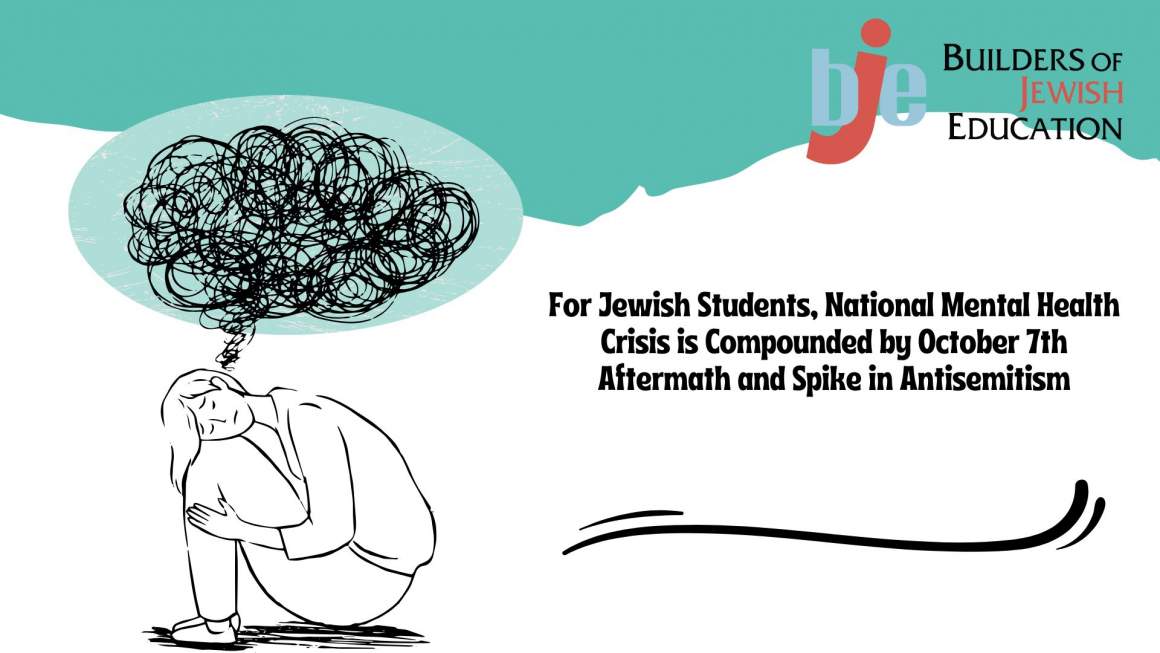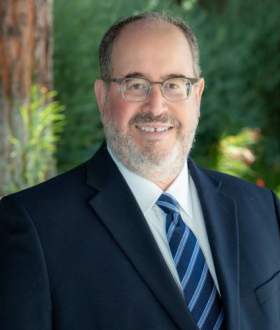
Mental Health Crisis Compounded Since Oct. 7th
For educators and administrators at middle and high schools across the country, the challenges of “post-COVID return to school” issues have been profound, and exacerbated by the already heightened student and parent anxiety levels that existed prior to the pandemic.
Some of these “post-COVID return to school” issues were created by online learning. While some students thrived in the remote learning format, others faced challenges to online access, and many found it difficult to stay focused and progress academically. The social isolation of staying home for many months impeded growth in social skills, classroom behavior, the ability to pay attention, and executive functioning. Depression and anxiety levels went up and self-esteem went down.
For decades, schools have focused on educating “the whole child.” Jewish day schools not only do that but, unlike many public schools or non-sectarian private schools, they go a step beyond and help inspire children to grow spiritually as well. This takes extra planning, additional Hebrew/Judaica teachers and, often, lengthening of the school day.
Imagine the challenge for Jewish day schools which, in the midst of dealing with the same struggles facing secular schools, suddenly faced the additional challenges of October 7th, the resulting wars in Gaza and Lebanon, and a huge increase in antisemitism in the U.S.
It’s no surprise, then, that before, during and after the pandemic - and even more so since October 7, 2023 - Jewish day schools have sought to meet the increased need for mental wellness programs by investing in a variety of Social Emotional Learning (SEL) programs, hiring new (or increasing the number of already existing) mental health professionals, and setting up special workshops for educators and for parents. BJE has been providing vital resources and training to Jewish schools across L.A. on each of these fronts.
SEL programs and the work of mental health professionals strengthen teachers’ skills and give them a green light to focus even more on educating the “whole child.” SEL curricula and classroom activities are designed to foster a deeper sense of community, acceptance, and understanding among classmates, and between teachers and students. These programs help students and teachers anticipate potential behavioral or learning problems, as well as give students and teachers guidance for solving them in sensitive ways. Jewish day schools have turned to BJE for resources and guidance in identifying SEL programs and for on-going teacher training.
One such program, Responsive Classroom, launched in 1981, connects creative lesson planning, creating a calm learning environment, and a positive classroom community. BJE has provided our local Jewish day school educators with Responsive Classroom training for a number of years. One of the signature elements of the program is the Morning Meeting which has four components: greeting, sharing, group activity and a morning message. This daily meeting allows each student to be warmly welcomed, and to share with others how they’re doing that day. They can let others know if they had a tough morning at home, if they’re worried about something, or if they are looking forward to something exciting after school. Occasional Class Meetings offer students the opportunity to problem-solve when there are conflicts.
In recent years, through a grant from the Jewish Community Foundation of Los Angeles, BJE provided training and certification to two cohorts of educators from across L.A.’s Jewish early childhood centers, part-time religious schools and day schools in the breakthrough approach of Positive Education. “Pos Ed” combines educational principles with the study of happiness and wellbeing to promote positive mental health. It uses the PERMA framework: Positive emotions, Engagement, (positive) Relationships, Meaning, and Accomplishment. BJE convenes CoPs (Communities of Practice) for the educators from all the participating schools. They talk about how they are implementing their training throughout their schools, what works, and the impact Pos Ed is having in their communities.
For many years, BJE has led a CoP for day school faculty who work with students with special needs, including a sub-group of mental health professionals. This group met often during COVID and continues to learn from one another, share resources, and serve as a sounding board and supportive vehicle for colleagues.
BJE support for SEL programs in Jewish day schools reflects both the growing need for schools to address students’ social-emotional wellbeing, and the role BJE continues to play as a central educational community resource. With ongoing input from educators, the partnership between day schools and BJE will continue to help bring the best resources and most creative solutions to the challenges facing students, families and educators across our L.A. Jewish community.

